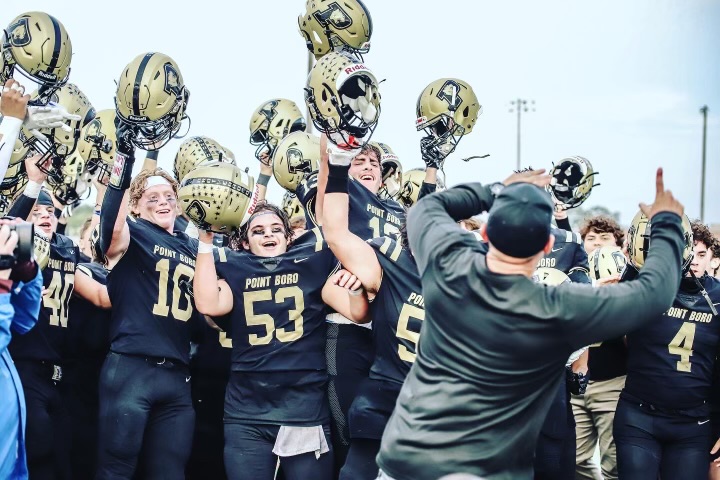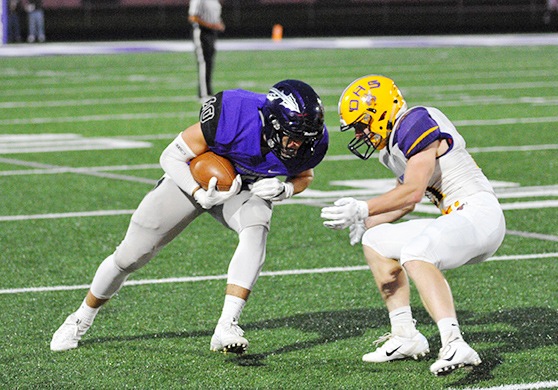Irish Eyes Are Smiling
Notre Dame has entrusted alum Charlie Weis as the man to recapture the football program’s proud legacy
COACH: You were born in Trenton, NJ in 1956 and graduated from Middlesex (NJ) High School. What was your childhood like? What sports did you participate in?
WEIS: Middlesex is a middle class town. I was one of five kids, the oldest of four boys. My sister was three years older than me. We were all three years apart so it always seemed like there was a Weis rotating through the high school. One was going out and one was coming in, for a whole bunch of years. My dad and my junior high school principal were my Little League baseball coaches for four years.I played every sport. I just wasn’t very good. In high school, I was on the football team. I played on the baseball team. I was a catcher. I played CYO Basketball. We played sports all of the time. We were all sports junkies.
COACH: You developed your football coaching roots at the high school level in New Jersey, beginning as an assistant at Boonton High in 1979, followed by stops at Morristown High (five seasons) and Franklin Township in 1989, that latter culminating in a State Championship. Talk about the importance of being a high school coach, not only from a personal standpoint, but also from an overall perspective.
WEIS: Morristown is where I really started to learn how to coach. I was only at Boonton for one year. And I didn’t really know what I didn’t know.
There was a guy by the name of John Chironna. He was the head coach at Morristown. He was really the first guy who had a very big influence on my coaching. He was really a good coach. He knew what he was doing.
Anyone who really wants to coach and have a lot of impact on people’s lives, high school’s the way to go. It really is, because you’re so much more than just a football coach. You’re a teacher. You’re a guidance counselor. You’re a second father. You’re a community leader. To be honest with you, of all of the jobs I’ve ever had, the one I really, truly enjoyed the most was teaching and coaching in high school. It just doesn’t pay as well.
COACH: You served four seasons (1985-89) under Joe Morrison at South Carolina, the last season taking on the added responsibility of assistant recruiting coordinator. What was that experience like and how did it help mold you for your future coaching stops?
WEIS: Coach Morrison was a great guy. I left Morristown High School and went to South Carolina as a Graduate Assistant. He gave me a whole bunch of different jobs in the years that I was there. He was a guy who had a very, very positive influence on me. For me, going from high school to college, I had to learn all over again how little I really knew. Because what happens is, everyone thinks that they know everything. All of sudden I went from high school to college and it felt like I was starting over again. He was very patient and he gave me a lot of work to do. I was willing to do anything he asked of me. I had a great relationship with him.
COACH: You are the first Notre Dame graduate to hold the head football coaching position on a full-time basis since Joe Kuharich did it from 1959-1962. Hugh Devore, a 1934 graduate, served as interim coach during the 1945 and 1963 seasons. How have you dealt with all of the media and fan attention/scrutiny at your alma mater, a place where you are perceived as a knight on a white horse?
WEIS: First of all, you can’t get too revved up listening to what anybody else says. I’ve mentioned two of the four most powerful coaching influences of my life, in Schironna and Morrison. But the next two are Parcells and Belichick. You have to factor these two guys into that question, because in reality, these are the two guys who molded my thinking on all of these issues. They have certain mannerisms and a certain way of doing it and rather than reinvent the wheel, you just do what you learned under those two guys and just tweak it with your own personality.
COACH: Much has been made of Notre Dame’s strict admission policies that hinder its ability to recruit upper-echelon student-athletes and thus stunt the program’s goal of being a national contender. What is your take on that subject and how have you dealt with it? Having earned a master’s degree in Education while coaching at South Carolina, we would assume that you’re a big proponent of stressing the importance of academics to your team.
WEIS: I think it just means that you have to be willing to recruit nationally. That’s what we do, recruit nationally. I have seven guys on the road right now and we’re all over the country. That’s where we are different from other schools that recruit regionally. Being an independent and being Notre Dame gives you an opportunity where you can get involved in the mix just about anywhere. Now, you might not get them. But you better be willing to fight for them. I think there are plenty of student-athletes and top-line football players in this country that are strong enough academically to go to Notre Dame. It’s just that you can’t limit yourself to just one region. You have to be willing to go nationally.
COACH: What has been the biggest adjustment for you going from the pro ranks to the collegiate ranks?
WEIS: How little time you have with the players. I’m used to working a lot of hours. With the 20 hours a week that you have with the players your time management skills have to really be extraordinary, because in the NFL you would have them for 60 hours a week and still have all the extra work to do. Here you have them for 20 hours a week. In reality that leaves 40 hours more a week for you to do other stuff: To prepare and do all the things you couldn’t do when you were in the NFL because you were with the players for all of those hours.
COACH: Your success with quarterbacks is well documented, particularly with Tom Brady. What is your approach to working with quarterbacks and tapping into their talent to achieve maximum results?
WEIS: There are two things. First of all, you don’t do anything the quarterback isn’t capable of doing. I think too many people ask the quarterback to do things that they’re not able to do, whether physically or mentally. You do what they can do. Secondly, they are an extension of the coaching staff. So what that means is that they have to take on a certain amount of responsibility that comes with being an extension of the offensive staff and being able to relay the whole ball of wax from the classroom to performing it on the field.
COACH: Quarterbacks will have bouts of adversity throughout a football game, whether it be throwing crucial interceptions or missing a read that could have resulted in a touchdown. In baseball, if a pitcher gets lit up, either a pitching coach or manager will come to the mound and settle them down with a few words or a quick quip. What is your remedy when your QB is struggling?
WEIS: There are a lot of things you can do to take the pressure off of a quarterback. There are things you can do just to get them going. But when a quarterback for me throws an interception, I can’t get him out there to throw another pass fast enough. You have to teach them to be shortsighted. They can’t look at something that just previously happened. They have to look at what’s going to happen. Not what just happened.
COACH: The success that you achieved as an offensive coordinator in the NFL is unparalleled, what with three Super Bowl rings with the New England Patriots and an AFC Championship appearance with the New York Jets. How did you develop your offensive acumen?
WEIS: I started with the Giants on quality control for the defensive staff when Parcells was the head coach and Belichick was the coordinator. What happens is, when you’re studying defenses, you’re always watching how opponents’ offenses attack those defenses. Therefore, you can see how different teams would use their offense and you have to defense it. It makes it a little easier when you’re looking at it from that perspective. Because you know how you would attack them yourself.
COACH: The wide receiver position is one that flourished during your coaching tenure in the NFL. Players such as Keyshawn Johnson, Wayne Chrebet, Deion Branch, and David Given posted career numbers for yards, receptions, and touchdowns under your tutelage. In your opinion, what separates the All-America/All-Pro receiver from the also-rans? There has to be more to it than good hands and running precise routes.
WEIS: There are receivers that do certain things. Every receiver is different. I think the first thing you have to do as a coach is identify – just as I talked about quarterbacks before – what can that receiver do the best? And then ask him to do those things. That may sound simple in layman’s terms but I think in our system we have always been able to put players in position to make plays, once we understand what their skills are, and then we try to utilize what they do the best.
COACH: You have said that as a coach, probably the most important thing that happens during training camp is evaluations that take place as you start to establish movement within your depth chart. Explain your evaluation process?
WEIS: First of all, you have to make sure that you always have an open mind. That you’re not getting into personalities when you’re coaching. Too many coaches play people, like in college, because a kid is a senior vs a kid who is a freshman. Parcells always believed that you have to go by what you see and you’re not in love with anybody. I think that if you’re very objective and you’re not taking personalities into play, you’re always going to make a decision based on facts rather than just a feel. As long as you’re capable of doing that, that you’re always going to put the people that are most deserving on the field.
COACH: As you stated in your preseason press conference, one of the things in pro football, that has now trickled down into the college game, are defenses being able to switch from a 4-3 defense to a 3-4 during a game. Explain the blocking schemes and/or protections that are needed on the offensive side to coincide with the defensive adjustments.
WEIS: Most people don’t understand the difference between a 4-3 and a 3-4. They will watch a game and say, “Oh, this team plays a 3-4.” Well, a 3-4 is just a personnel grouping unless there is odd space on both guards. And to explain that to the layman, it means that there is no defensive lineman lined up on either guard. To be honest, anyone in the NFL or college treats it as such. So it isn’t the personnel grouping as it is the spacing. And the spacing basically comes down to where are the defensive linemen lined up in comparison to the offensive linemen.
COACH: In Bill Parcells and Bill Belichick, you have worked under two future Hall of Fame coaches who are among the most detail-oriented, if not controlling, in the business. It wouldn’t be a stretch to call them hardliners from the old-school style of coaching. That said, how have you been able to indoctrinate what you learned from them, while instituting your quiet disciplinary approach, and incorporate that into a collegiate program and make it work?
WEIS: I think you just copycat it. You plagiarize. People laugh when I say that. I came from the Patriots where I had been for five years. Their whole motto there is that it is all about the team and getting people to suppress their egos. Well, where wouldn’t that work? It would work anywhere in any sport. Now, getting that done is a lot more difficult than knowing what you have to do. But in any sport, if you can get the team to believe that the team is more important than the individual you will always have a fighting chance.
COACH: How do you help your players develop character?
WEIS: Fortunately, when we talk about character, I have to believe that most of the kids we bring in here are already of high-quality character. That’s a byproduct of their upbringing, by their parents, by their coaches, and by their communities. We usually have a good bunch of kids. But I think once you get people buying into being part of a program and not being selfish, I think the character obviously follows. Because everyone feels good about being part of something, not just being about I, I, me, me.
COACH: One of the most common coaching mistakes is to provide inaccurate feedback and advice on how to correct errors. Good coaches can recognize when their players make two types of errors: learning errors and performance errors. What is your approach when it comes to detecting and correcting errors?
WEIS: I have a lot bigger problem with the mental error than I do a physical error. I think that sometimes you have physical limitations where you are playing against a guy who is pretty good. I have much less of problem when someone gets beat physically. My bigger problem is, especially with the type of high intellect kid that we are bringing in here, that mental mistakes should be at a minimum.
COACH: Talk about the importance of the family support structure being a coach, an important aspect that is sometimes overlooked? Obviously it is imperative to have an understanding wife and children.
WEIS: These guys all know about my wife and kids. And they all know that my son, Charlie, is on the sideline for every game, which he is, home and away. He travels with us, so they see him around all of the time. I have a special needs daughter, Hannah, and they know I raise a whole bunch of money for people with special needs. [In 2003, Weis and his wife, Maura, established the Hannah & Friends Foundation, dedicated to children affected by developmental disorders]. So my players and staff know that I am not a hypocrite when it comes to family. Now, when it comes to the Notre Dame family, I deal with them as if, “What would I do if this were my son, Charlie, involved in the same issue?” And as long as they know, and their parents know, that I am viewing them as I would my own kid, then I don’t have too much negative feedback.
COACH: Brilliant minds have an uncanny ability to see things beyond the normal realm, whether it’s a sculptor and a mound of clay or a mathematician and an equation. What do you see when you look at a defense?
WEIS: When I watch an opponent, I check every play from the entire year. I don’t just watch the last three games. If they played six games, I’d watch all six. I’d start with the first game and go right through to the sixth.
What it does then is take on a personality. As you watch the defense, as an offensive coordinator, you usually get a feel for what the defense and defensive coordinator likes to do in certain situations. Then, when you validate it with objective material out of the computer, that feeling should still be there.
It’s easier when you can sit there with a clicker. You can then watch the play as many times as you want to determine a team’s defensive personality, then validate what it is doing.
The tougher part of the question is what people are able to do on game day and see what is happening at the same time.
Being an offensive play-caller who’s on the field, because I’m also the head coach, my advice to anyone who has the choice of being on the field or upstairs in the coaches box, I’d pick upstairs every time. You will be able to see the field, and everything that is happening, much easier from a seat in the box than from the field – with a lot less distractions.
About the Author
Kevin Newell is the former editor of Coach and Athletic Director magazine.





